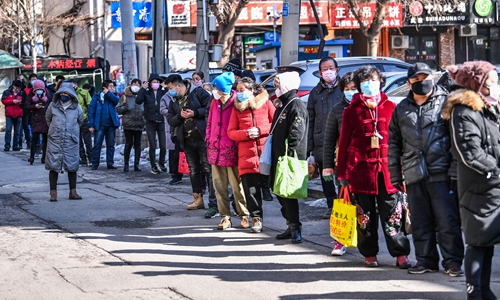Nearby regions boost scrutiny over travelers from Harbin in wake of local clustered infections

Photo: IC
Travelers from Harbin and Mudanjiang in Northeast China's Heilongjiang Province, which is facing mounting pressure from local cluster infections caused by imported COVID-19 cases, are now coming under close scrutiny in nearby regions.
City authorities in Shenyang, capital of Northeast China's Liaoning Province, rolled out a series of measures to prevent the influx of imported COVID-19 cases and a domestic epidemic rebound, which include the compulsory filing of information from every traveler from Harbin and Mudanjiang, collecting information such as their name, ID card information, and their health status as well as their nucleic test history, media reported on Thursday.
Starting Monday, people from Harbin and Mudanjiang who fail to present a "green health code" and negative nucleic test result within seven days of their entry to the city will undergo a 14-day home quarantine, during which they will be given two nucleic tests.
Those who travelled to Shenyang in April before the policy announcement also have to take a nucleic test.
Shenyang has also allocated personnel responsible for taking the body temperatures of travelers from cities in Heilongjiang twice daily via video technology, and checking their locations through a social media app.
Police will follow the cases where travelers refuse to obey the quarantine rules and leave their lodgings.
Dalian, also in Liaoning Province, announced on Wednesday that public venues and accommodation units in the city are not allowed to take in travelers who have been to Heilongjiang Province in the past 14 days and fail to present negative nucleic test results within seven days.
Changchun in Jilin Province has also required 14-day quarantine for travelers from Harbin and Mudanjiang, during which three nucleic tests will be given to these travelers.
Harbin reported a total of 52 active confirmed cases and 23 asymptomatic infections as of Tuesday midnight, a rise compared with the numbers two weeks ago.
Global Times
